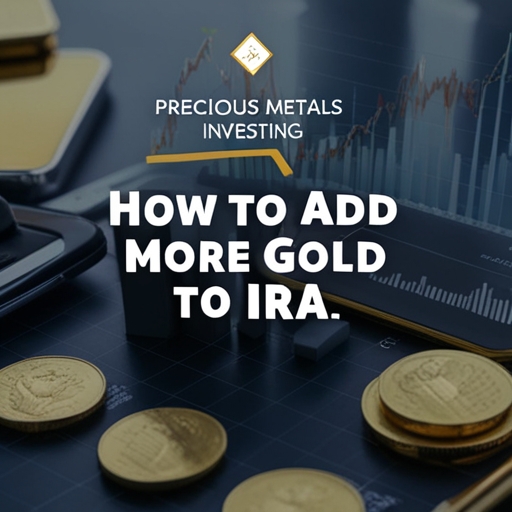Investing in precious metals, particularly gold, has long been considered a wise strategy for diversifying retirement portfolios. If you're looking to add more gold to your IRA, you're on the right track to enhancing your financial security. This comprehensive guide will walk you through the entire process of incorporating gold into your retirement savings, providing you with the knowledge and tools needed to make informed decisions.
| Key Points | Description |
|---|---|
| Self-Directed IRA | Required for alternative investments like precious metals |
| IRA Custodian | Specialized custodian needed for precious metals IRAs |
| Funding Options | IRA rollover or direct contribution |
| IRS Regulations | Gold must meet specific purity and authenticity standards |
| Storage | Secure storage in a precious metals depository required |
The Process for Adding More Gold To Your IRA
Incorporating gold into your Individual Retirement Account (IRA) is a strategic move that requires careful planning and execution. The process begins with opening a self-directed IRA, which allows for alternative investments like precious metals. This type of account provides the flexibility needed to include IRS-approved gold in your retirement portfolio.
Next, you'll need to select a reliable IRA custodian who specializes in precious metals IRAs. This custodian will play a crucial role in facilitating the purchase and storage of your gold assets. Once your account is established, you can fund it through an IRA rollover or a direct contribution, keeping in mind the IRA contribution limits set by the IRS.

After funding your account, the next step is to purchase gold from a reputable metals exchange or dealer. It's crucial to ensure that the gold you acquire meets IRS regulations for purity and authenticity. Finally, you'll need to arrange for physical gold storage in a precious metals depository to safeguard your investment.
Key Features of a Gold IRA
Understanding the key features of a Gold IRA is essential for making informed investment decisions. One of the primary advantages is the tax-deferred nature of the investment. This means your gold investment can grow without immediate tax implications, potentially leading to significant long-term benefits.
Another crucial feature is the ability to diversify your retirement portfolio. By including gold bars and gold coins, you can hedge against inflation and protect your assets from market volatility. Gold is often viewed as a safe-haven asset, providing stability during uncertain economic times.
Integrating Precious Metals into Your IRA
Integrating gold into your IRA involves several components. First and foremost, you need to work with a custodian who offers custodial services for precious metals. This ensures that your gold is stored securely and in compliance with IRS regulations.
Consider expanding your precious metals portfolio beyond gold. Incorporating silver and platinum can further enhance your portfolio diversification and provide additional protection against inflation. A well-rounded precious metals IRA often includes a mix of these valuable metals.
Lastly, explore the possibility of including gold mining stocks or a gold ETF in your IRA. These alternative investments can provide exposure to the gold market without the need for physical gold storage. However, it's crucial to understand the risks and benefits associated with these options before making any investment decisions.
Cost Considerations for Adding Gold to Your IRA
The cost of adding gold to your IRA can vary based on several factors. The primary consideration is the price of gold itself, which is influenced by the gold spot price. This price fluctuates based on market conditions and can significantly impact the overall cost of your investment.
In addition to the gold price, you'll need to account for custodial fees. These fees cover the cost of managing your IRA and storing your gold in a precious metals depository. It's important to compare fees from different custodians to find the best option for your needs.
Other costs may include transaction fees for buying and selling gold, as well as shipping and insurance fees for physical gold storage. Be sure to factor in these costs when planning your gold investment strategy to ensure you're making informed financial decisions.
Benefits of Diversifying with Precious Metals
Diversifying your retirement portfolio with precious metals offers several compelling benefits:
- Hedge against inflation: Gold and other metals tend to retain their value over time, helping to preserve your assets in the face of rising prices.
- Portfolio diversification: Including gold, silver, and platinum in your IRA can help balance risk and reward more effectively.
- Stability during economic downturns: Precious metals are considered safe-haven assets, providing stability during uncertain times.
- Potential for growth: While past performance doesn't guarantee future results, gold has shown potential for long-term appreciation.
Steps to Transfer Funds to Your Gold IRA
Transferring funds to your Gold IRA involves a few key steps:
1. Decide between an IRA transfer or an IRA rollover. An IRA transfer involves moving funds directly from one IRA to another, while a rollover involves withdrawing funds and depositing them into a new IRA within 60 days.
2. Contact your current IRA custodian to initiate the transfer. They will guide you through the process and ensure that the transfer complies with IRS regulations.
3. Once the funds have been transferred, use them to purchase gold and other precious metals for your IRA. Work with a reputable dealer to ensure that your purchases meet IRS standards for purity and authenticity.
4. Arrange for secure storage of your precious metals in an approved depository.
Understanding the Tax Implications
Grasping the tax implications of a Gold IRA is crucial for effective retirement planning. One of the main benefits of a Gold IRA is its tax-deferred status, allowing your investment to grow without immediate tax consequences.
However, it's important to be aware of potential tax liabilities when withdrawing funds from your IRA. Withdrawals are typically taxed as ordinary income, and early withdrawals may incur additional penalties.
Consider the tax advantages of a Roth IRA, which allows for tax-free withdrawals in retirement. Converting a traditional IRA to a Roth IRA can provide significant tax benefits, but it's important to consult with a tax professional to understand the implications fully.
Selecting the Right IRA Custodian
Choosing the right IRA custodian is a critical step in setting up your Gold IRA. Look for a custodian with extensive experience in managing precious metals IRAs and a strong reputation in the industry.
Consider the custodian's fees, services, and storage options when making your decision. Some custodians offer comprehensive custodial services, including secure storage in a precious metals depository.
Ensure that the custodian complies with IRS regulations and has a track record of reliable service. Take the time to research and compare different custodians to find the best fit for your specific needs and investment goals.
Potential Risks and Considerations
While investing in a Gold IRA can offer numerous benefits, it's important to be aware of potential risks and considerations. One of the main risks is the volatility of the gold market, which can impact the value of your investment.
Additionally, there are costs associated with purchasing and storing gold, including custodial fees and transaction fees. These costs can accumulate over time and impact your overall returns.
Consider the liquidity of your investment. While gold is a valuable asset, it may not be as easily convertible to cash as other investments. Be sure to weigh these factors carefully when planning your gold investment strategy.
Storage Options for Your Precious Metals
When it comes to storing your precious metals, several options are available:
1. Precious metals depository: This option offers secure storage and insurance for your gold.
2. Bank safe deposit box: While providing added security, ensure that the bank offers adequate insurance coverage for your assets.
3. Home storage: This comes with additional risks and responsibilities and is generally not recommended for IRA-held assets.
Consider the pros and cons of each storage option before making a decision that aligns with your investment goals and risk tolerance.

Eligibility Requirements for a Gold IRA
To be eligible for a Gold IRA, you must meet certain requirements set by the IRS:
1. Earned income: You need to have earned income to make IRA contributions.
2. Age and income limits: There are specific age and income limits for IRA contributions that can impact your eligibility.
3. Custodian requirements: Work with a custodian who specializes in precious metals IRAs to ensure compliance with all IRS requirements.
Review the IRS regulations carefully to ensure that you meet all necessary criteria before proceeding with your Gold IRA investment.
Conclusion
Incorporating gold into your IRA can be a strategic move for enhancing your retirement portfolio. By understanding the process, costs, and benefits, you can make informed decisions that align with your financial goals. A Gold IRA offers a unique opportunity for portfolio diversification, inflation protection, and asset preservation.
However, it's crucial to work with a reputable IRA custodian and adhere to IRS regulations to ensure the success of your investment. As you consider adding gold to your IRA, weigh the potential risks and benefits carefully. With the right strategy and guidance, a Gold IRA can be a valuable addition to your retirement planning, providing both stability and potential growth for your financial future.
Frequently Asked Questions
What types of gold can be included in a Gold IRA?
A Gold IRA can include IRS-approved gold, such as gold bullion and gold coins that meet specific purity standards set by the IRS.
Can I store my Gold IRA assets at home?
While possible, home storage is generally not recommended due to security concerns and potential IRS compliance issues. Using a precious metals depository is the safer and more compliant option.
How do I choose the best IRA custodian for my Gold IRA?
Look for custodians with experience in precious metals IRAs, competitive fees, and secure storage options. Research their reputation and ensure they comply with IRS regulations to find the best fit for your needs.

